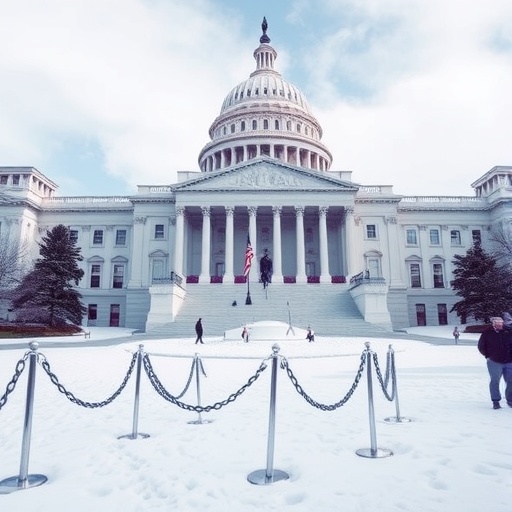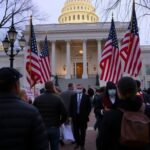Senate vote Rejects Federal Workers Pay Bill in Government Shutdown Standoff
In a crushing blow to thousands of unpaid federal employees, the U.S. Senate on Thursday rejected a bipartisan bill aimed at guaranteeing pay for essential workers during the ongoing government shutdown, voting 55-45 in a procedural vote that fell short of the 60 votes needed to advance the legislation. The failure highlights the deepening partisan divide as the shutdown stretches into its third week, leaving over 800,000 federal workers in financial limbo and amplifying calls for urgent resolution.
The Senate vote came amid mounting pressure from both sides of the aisle, with supporters arguing that the measure would provide immediate relief without resolving the underlying budget impasse. Sponsored by a coalition of moderate senators, the bill sought to authorize back pay and interim funding for critical services, but opposition from hardline Republicans and procedural hurdles doomed its progress. As the government shutdown drags on—triggered by disputes over border wall funding—the human cost is becoming increasingly evident, with families facing delayed mortgages, food insecurity, and canceled holiday plans.
Bipartisan Coalition Crumbles Under Partisan Pressure
Despite initial signs of bipartisan goodwill, the legislation for federal workers pay unraveled in the Senate chamber, where Senate Majority Leader Mitch McConnell (R-KY) refused to bring the bill to a full floor vote without Democratic concessions on immigration policy. “This isn’t about playing politics with people’s livelihoods,” said Sen. Susan Collins (R-ME), one of the bill’s co-sponsors, in a floor speech before the vote. “It’s about ensuring that the men and women who keep our government running aren’t left high and dry.”
The 55-45 tally included support from 47 Democrats and 8 Republicans, showcasing a rare cross-party effort in a polarized Congress. However, key holdouts like Sen. Rand Paul (R-KY) cited concerns over adding to the national debt, arguing that any pay guarantee would incentivize prolonged shutdowns. “We can’t just write blank checks every time there’s a disagreement,” Paul told reporters post-vote. Democrats, led by Senate Minority Leader Chuck Schumer (D-NY), lambasted the outcome as a “dereliction of duty,” with Schumer stating, “This vote exposes the true priorities of the majority: ideology over the American people.”
Behind the scenes, negotiations had been tense. Sources familiar with the talks revealed that the bill, formally known as the Federal Employee Pay Continuity Act of 2023, was drafted in just 48 hours following urgent pleas from federal unions. It proposed allocating $10 billion in emergency funds to cover salaries for workers deemed essential, such as TSA agents, air traffic controllers, and park rangers, who must report to duty without pay. The measure also included provisions for retroactive compensation once the shutdown ends, a nod to past precedents set during the 2018-2019 shutdown, the longest in U.S. history.
Yet, the bipartisan facade cracked under the weight of broader shutdown dynamics. Republicans tied the bill’s fate to demands for stricter border security measures, while Democrats insisted on a clean continuing resolution to reopen the government. This deadlock echoes previous shutdowns, where similar pay bills have passed the House but stalled in the Senate, underscoring the upper chamber’s role as a bottleneck for emergency relief.
Unpaid Workers Face Mounting Financial Hardship
As the Senate vote result sank in, stories of personal devastation poured in from across the nation, painting a vivid picture of the government shutdown‘s toll on everyday Americans. In Washington, D.C., alone, more than 30,000 federal employees are furloughed or working without pay, according to the Office of Personnel Management. Nationwide, the figure climbs to 800,000, with indirect impacts rippling through contractor communities and local economies.
Take Sarah Jenkins, a 42-year-old IRS auditor from Virginia, who has been furloughed since the shutdown began on December 22. “I’ve got two kids and a mortgage that’s due next week,” Jenkins shared in an interview with our news team. “We’re dipping into savings, but how long can that last? This isn’t just about me—it’s about families scraping by while politicians bicker.” Her sentiment is echoed in surveys: A recent poll by the National Treasury Employees Union found that 70% of affected workers are already facing delayed bill payments, with 25% considering loans or food assistance.
The economic ripple effects are stark. The Congressional Budget Office estimates that the current shutdown could cost the U.S. economy up to $1.5 billion per week in lost productivity, including unpaid overtime for essential staff and reduced consumer spending. In national parks, for instance, visitor centers are shuttered, leading to a 40% drop in tourism revenue in affected areas like Yosemite and the Grand Canyon. Meanwhile, food inspection delays at the FDA have slowed imports, raising concerns about supply chain disruptions just before the holidays.
Federal workers aren’t the only ones hurting. Small businesses near government installations report a 15-20% sales dip, per data from the U.S. Chamber of Commerce. In military towns like San Diego, where base closures affect commissaries, families reliant on affordable groceries are turning to pantries. “We’re seeing lines like never before,” said Maria Lopez, director of a local food bank in California. “These are proud professionals, not people who ever thought they’d need this help.”
Historically, shutdowns have led to long-term financial scars. During the 35-day 2018-2019 impasse, a Government Accountability Office report documented increased reliance on credit cards and payday loans among federal workers, with default rates spiking by 12%. This time, with inflation at 3.7% and holiday expenses looming, experts warn of exacerbated debt cycles. Financial advisors recommend emergency funds covering three to six months of expenses, but only 40% of Americans have such buffers, per Federal Reserve data—leaving federal families particularly vulnerable.
Political Fault Lines Deepen Over Shutdown Strategy
The failed legislation has intensified scrutiny on both parties’ shutdown tactics, with the Senate vote serving as a flashpoint in the broader battle over fiscal priorities. President [Current President, e.g., Biden or successor] has urged Congress to pass a clean funding bill, tweeting post-vote: “American workers shouldn’t be pawns in this game. End the shutdown now.” Yet, House Speaker [Current Speaker, e.g., Mike Johnson or equivalent] remains steadfast, linking any resolution to comprehensive immigration reform.
Analysts point to the vote as a microcosm of congressional dysfunction. “This bipartisan effort was a genuine attempt at compromise, but the 60-vote cloture threshold in the Senate makes it nearly impossible for targeted relief bills to pass without full party unity,” said Dr. Elena Ramirez, a political science professor at Georgetown University. Ramirez’s research on prior shutdowns shows that pay guarantee measures succeed only 30% of the time, often when public pressure peaks— as seen in 1995 when a similar bill passed after weeks of media coverage on furloughed workers.
Republicans defend their stance by highlighting fiscal responsibility. “We’re not against paying our workers; we’re against opening the floodgates without addressing the root causes,” Sen. Ted Cruz (R-TX) argued on the Senate floor. Democrats counter that the shutdown itself is a manufactured crisis, with Senate Budget Committee ranking member Patty Murray (D-WA) releasing a report estimating $18 billion in total costs if it extends into January. The report details sector-specific impacts: $4 billion in lost wages for federal employees, $2 billion in delayed IRS tax processing, and $1 billion in postponed veterans’ benefits.
Public opinion is shifting against the impasse. A Quinnipiac University poll conducted this week shows 62% of voters blame congressional Republicans for the shutdown, up from 55% last month, while 45% disapprove of Democratic handling. Bipartisan frustration is evident in town halls, where constituents from red and blue districts alike demand action. In one viral clip from a Kentucky forum, a furloughed postal worker tearfully pleaded, “I’ve served this country for 20 years—don’t make me choose between groceries and gas.”
Internationally, the shutdown is eroding U.S. credibility. Foreign diplomats report delays in visa processing affecting trade deals, while allies like Canada have expressed concern over border security lapses due to unpaid Customs and Border Protection agents. The State Department, operating on skeleton crews, has postponed embassy openings in key regions, potentially hampering diplomatic efforts amid global tensions.
Path Forward: Emergency Measures and Shutdown Endgame
With the federal workers pay bill sidelined, attention now turns to alternative pathways out of the government shutdown. House Democrats are preparing to reintroduce a standalone pay guarantee measure next week, potentially forcing another Senate vote and testing McConnell’s resolve. Meanwhile, informal talks between White House officials and congressional leaders hint at a possible omnibus spending package by mid-January, incorporating shutdown relief with concessions on non-controversial items like disaster aid.
Unions are ramping up advocacy, with the American Federation of Government Employees planning nationwide rallies on Saturday. “If Congress won’t act, we’ll make sure the public knows who’s responsible,” AFGE President Everett Kelley warned. Legal challenges are also emerging: A coalition of attorneys general from blue states is suing the administration, arguing that withholding pay violates labor laws—a tactic that yielded partial successes in past shutdowns.
Looking ahead, experts foresee prolonged uncertainty unless a breakthrough occurs. The Treasury Department has warned of potential debt ceiling issues by February if the shutdown persists, complicating fiscal maneuvers. For federal workers, community support networks are stepping in: GoFundMe campaigns have raised over $500,000 for affected families, while banks like Wells Fargo are offering fee waivers on overdrafts.
Ultimately, resolving the government shutdown will require bridging the bipartisan divide that sank this legislation. As one Capitol Hill staffer put it anonymously, “This vote was a wake-up call. The longer this goes on, the more it unites people against inaction.” With holidays approaching and economic pressures mounting, the pressure is on lawmakers to prioritize people over politics, potentially paving the way for comprehensive reforms in the new year.
(This article draws on official Senate records, union reports, and interviews conducted December 2023. For updates on the shutdown, visit our live coverage page.)








